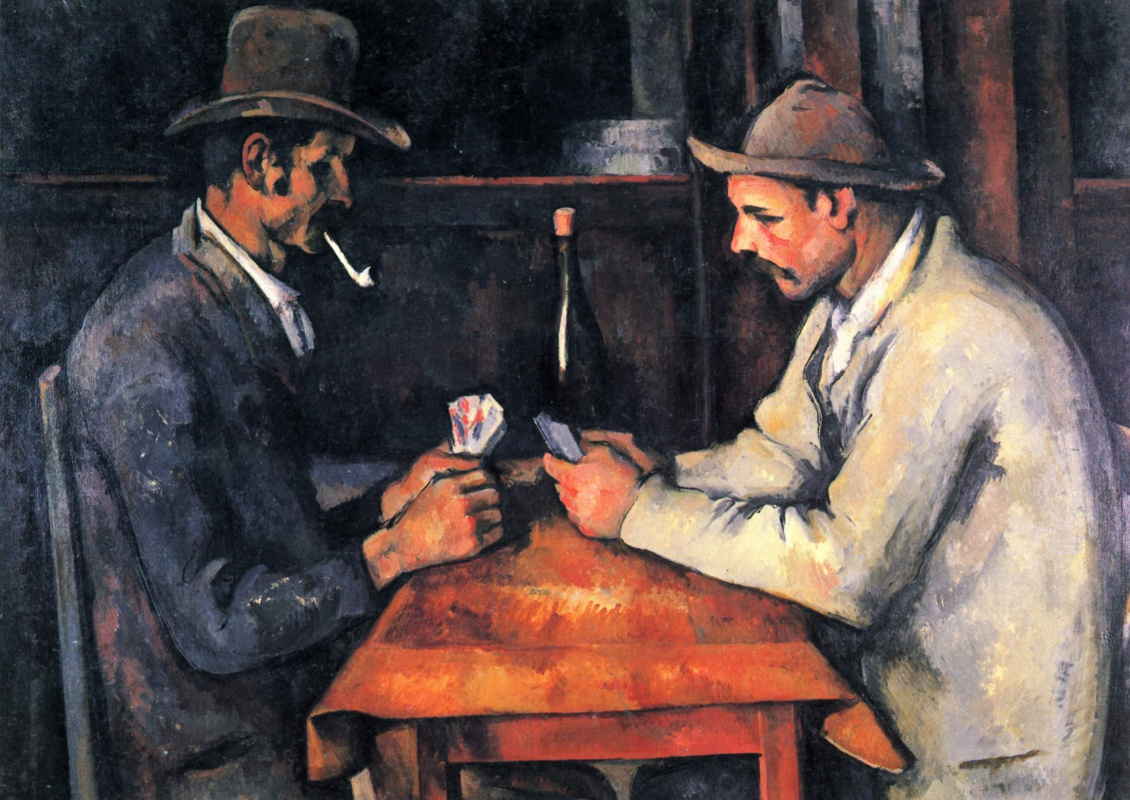log in
Login to use Arthive functionality to the maximum
The card players
Paul Cezanne • Painting, 1893, 97×130 cm
Description of the artwork «The card players»
While in 2015 painting by Paul Gauguin "When's the wedding?"not was sold for $ 300 millionthese "The card players" Cezanne was the most expensive painting in the world ever offered for sale over the past half century. The painting was bought in 2011 the Emir of Qatar for his private collection (over 250 million).
Unlike many of his fellow artists who doubt the value of their own works, Cezanne periodically felt, and sometimes said out loud that he is a genius and his paintings will begin to understand much soon after his death. Even friends, the future artists, the Impressionists, who performed his revolutionary exhibition, afraid of the wild painting by Cezanne. Critics of Cezanne and without them indiscriminately despised, and Cezanne was up to their events looked deliberately and excessively provocative.
Critics find in this series of 5 paintingsnot much confirmed philosophical and symbolic meanings. There have been attempts to consider here the picturesque allegory of the battle, from which Cezanne comes out the winner was a variation on a theme cards of fate and the choice that man makes himself granted him the choice possibilities. Fans of psychological connotations seen in the story of the confrontation between Paul and his father, which lasted until the death of the old man and the Cubists, Cezanne declared its predecessor, argued that in these figures no more warmth than the still life that the entire painting is nothing more than "the cylinder, sphere and cone". But it is unlikely that Cezanne is so simple – it is solely interested in, he would have never left the Studio and just ordered a kilo of apples for a week.
In fact, the artist was able to keep in mind all of these meanings, or none at all – is much more important potential challenge to the audience: to connect to the creation of meanings, to create and to strain to understand.
With more confidence we can assume that especially attracted Cezanne in the playing process: the tense confrontation and the work of the heart with complete immobility. That is what Paul loved the mountains and apples for stillness. These are the models he wanted, going out when tired wife on the 20th session of posing suddenly moved and ruined everything. He dreamed that people were like apples. And finally fleeing from the loud, bustling Paris to the estate of the father Mrs. de Bouffan, he found his apples. Local farmers, gardener, maids, they knew how to be truly still and focused, they lived is measured and thoughtful, in the same rhythm with nature, with the sun.
While working on the series for more than five years, Cezanne started with a huge two-meter canvas and multi-figure compositions (1), the second picture has reduced the number of figures to four (2), and on the other left only the most important – two rivals, a bottle, which they most likely play the table and card. Nothing superfluous and distracting, element of transitoriness. Only the eternal.
Author: Anna Sidelnikova
Unlike many of his fellow artists who doubt the value of their own works, Cezanne periodically felt, and sometimes said out loud that he is a genius and his paintings will begin to understand much soon after his death. Even friends, the future artists, the Impressionists, who performed his revolutionary exhibition, afraid of the wild painting by Cezanne. Critics of Cezanne and without them indiscriminately despised, and Cezanne was up to their events looked deliberately and excessively provocative.
Critics find in this series of 5 paintingsnot much confirmed philosophical and symbolic meanings. There have been attempts to consider here the picturesque allegory of the battle, from which Cezanne comes out the winner was a variation on a theme cards of fate and the choice that man makes himself granted him the choice possibilities. Fans of psychological connotations seen in the story of the confrontation between Paul and his father, which lasted until the death of the old man and the Cubists, Cezanne declared its predecessor, argued that in these figures no more warmth than the still life that the entire painting is nothing more than "the cylinder, sphere and cone". But it is unlikely that Cezanne is so simple – it is solely interested in, he would have never left the Studio and just ordered a kilo of apples for a week.
In fact, the artist was able to keep in mind all of these meanings, or none at all – is much more important potential challenge to the audience: to connect to the creation of meanings, to create and to strain to understand.
With more confidence we can assume that especially attracted Cezanne in the playing process: the tense confrontation and the work of the heart with complete immobility. That is what Paul loved the mountains and apples for stillness. These are the models he wanted, going out when tired wife on the 20th session of posing suddenly moved and ruined everything. He dreamed that people were like apples. And finally fleeing from the loud, bustling Paris to the estate of the father Mrs. de Bouffan, he found his apples. Local farmers, gardener, maids, they knew how to be truly still and focused, they lived is measured and thoughtful, in the same rhythm with nature, with the sun.
While working on the series for more than five years, Cezanne started with a huge two-meter canvas and multi-figure compositions (1), the second picture has reduced the number of figures to four (2), and on the other left only the most important – two rivals, a bottle, which they most likely play the table and card. Nothing superfluous and distracting, element of transitoriness. Only the eternal.
Author: Anna Sidelnikova


